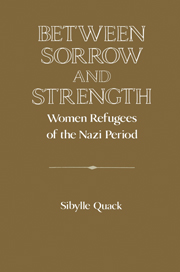Book contents
- Frontmatter
- Introduction
- Prologue: Jewish Women in Nazi Germany Before Emigration
- Part One A Global Search for Refuge
- Part Two Refuge in the United States
- 12 Women's Role in the German-Jewish Immigrant Community
- 13 “Listen sensitively and act spontaneously - but skillfully”: Selfhelp: An Eyewitness Report
- 14 “My only hope”: The National Council of Jewish Women's Rescue and Aid for German-Jewish Refugees
- 15 The Genossinen and the Khaverim: Socialist Women from the German-Speaking Lands and the American Jewish Labor Movement, 1933-1945
- 16 New Women in Exile: German Women Doctors and the Emigration
- 17 Women Emigré Psychologists and Psychoanalysts in the United States
- 18 Destination Social Work: Emigrés in a Women's Profession
- 19 Chicken Farming: Not a Dream but a Nightmare: An Eyewitness Report
- 20 The Occupation of Women Emigrés: Women Lawyers in the United States
- 21 Fashioning Fortuna's Whim: German-Speaking Women Emigrant Historians in the United States
- 22 Exile or Emigration: Social Democratic Women Members of the Reichstag in the United States
- 23 Women's Voices in American Exile
- Epilogue: The First Sex
- Index
21 - Fashioning Fortuna's Whim: German-Speaking Women Emigrant Historians in the United States
Published online by Cambridge University Press: 05 January 2013
- Frontmatter
- Introduction
- Prologue: Jewish Women in Nazi Germany Before Emigration
- Part One A Global Search for Refuge
- Part Two Refuge in the United States
- 12 Women's Role in the German-Jewish Immigrant Community
- 13 “Listen sensitively and act spontaneously - but skillfully”: Selfhelp: An Eyewitness Report
- 14 “My only hope”: The National Council of Jewish Women's Rescue and Aid for German-Jewish Refugees
- 15 The Genossinen and the Khaverim: Socialist Women from the German-Speaking Lands and the American Jewish Labor Movement, 1933-1945
- 16 New Women in Exile: German Women Doctors and the Emigration
- 17 Women Emigré Psychologists and Psychoanalysts in the United States
- 18 Destination Social Work: Emigrés in a Women's Profession
- 19 Chicken Farming: Not a Dream but a Nightmare: An Eyewitness Report
- 20 The Occupation of Women Emigrés: Women Lawyers in the United States
- 21 Fashioning Fortuna's Whim: German-Speaking Women Emigrant Historians in the United States
- 22 Exile or Emigration: Social Democratic Women Members of the Reichstag in the United States
- 23 Women's Voices in American Exile
- Epilogue: The First Sex
- Index
Summary
Summing up her life as a historian, Helene Wieruszowski once wrote that although subject to “the whims of Fortuna,” her life had been “rich in human experiences and filled to the brim with hardships and pleasures, promises and frustrations.” Wieruszowski's remarks capture much of the story of the sixteen women who were or became historians following their emigration from German-speaking Europe to the United States after 1933. All these women underwent the hardships of emigration as an adult or as a child. As historians, they experienced the pleasures of unanticipated intellectual discoveries, the promises of new or renewed careers, and the frustrations of being women in the male-dominated history profession. Yet, although they share the commonalties of being women, refugees, and historians, little else unites these women. They have had very different historical interests, varying degrees of success within American academia, and very different reactions to their situations as women and as refugees. Some have taught at large universities, others in small colleges, and still others have pursued their historical research largely independent of institutional affiliations. Some of these women emigrant historians have married, some divorced, and some remained single. Some of them became mothers; others remained childless.
- Type
- Chapter
- Information
- Between Sorrow and StrengthWomen Refugees of the Nazi Period, pp. 301 - 324Publisher: Cambridge University PressPrint publication year: 1995



